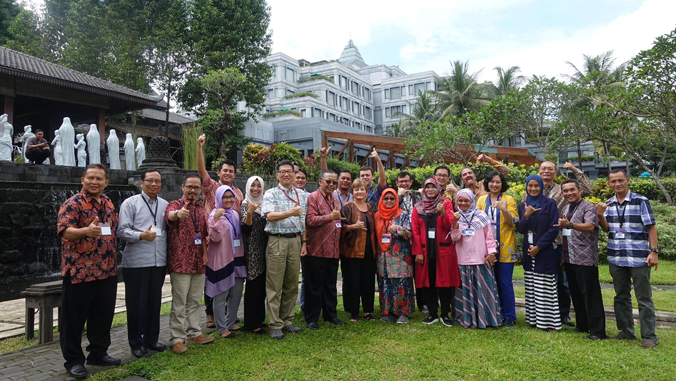
A new $400,000 award will boost efforts by the University of Hawaiʻi at Mānoa’s Department of Urban and Regional Planning (DURP) to work on disaster risk-reduction initiatives in Indonesia. Indonesia has the largest archipelago in the world made up of more than 17,000 islands and lies in the Pacific “Ring of Fire,” which is prone to natural disasters. DURP from the College of Social Sciences received the award from Mercy Corps and the Bureau of Humanitarian Affairs in the U.S. Agency for International Development (USAID).
The award supports INVEST-DM 2.0 (Investing in Human Capital for Disaster Management), a project that adds capacity to the Government of Indonesia National Disaster Management Agency. Karl Kim, director of the Pacific Urban Resilience Lab and the graduate program on Disaster Management and Humanitarian Assistance, will lead the partnership on behalf of UH Mānoa.
“This new grant builds on the strengths of the university and our strong relationships with key institutions in Indonesia. The project expands work done over the past decade to foster collaborative relationships between governments, international organizations and universities to understand the impacts of climate change, sea-level rise, volcanoes and other threats. As island communities are exposed to many of the same hazards, there is much knowledge to be shared between Hawaiʻi, Indonesia and other countries in the region,” said Kim, who is also a professor of urban and regional planning and executive director of the National Disaster Preparedness Training Center.
Advancing disaster management work
Through INVEST-DM 2.0, UH will continue its impactful, collaborative work with universities, humanitarian aid agencies and philanthropic organizations throughout the Asia-Pacific region. Seminars, webinars and events bringing researchers and practitioners from Indonesia and the U.S. are currently underway.
INVEST-DM 2.0 builds upon the work that UH Mānoa began in the first phase of the project, INVEST-DM 1.0 (July 2019–September 2020), and an earlier award from USAID called Building Resilience Through Training (2013–17).
“This new grant continues more than a decade of collaboration between the University of Hawaiʻi and these partners in Indonesia. Through the dedication and talent of our faculty and staff, we have provided capacity development, education and training to address critical needs for disaster preparedness, community resilience and climate adaptation,” said Denise Eby Konan, dean of UH Mānoa’s College of Social Sciences, who initiated collaborative agreements between UH and educational institutions in Indonesia.
UH Vice President for Research and Innovation Vassilis L. Syrmos said, “The University of Hawaiʻi is pleased to be able to support its partnership with Mercy Corps Indonesia and the Government of Indonesia through this important grant from the U.S. Agency for International Development. This collaborative program reinforces the University of Hawaiʻi’s long-standing commitment to help develop and promote effective disaster response capabilities in the Asia-Pacific region through cutting-edge research, innovation and training.”
Andrew Duncan, chief of the party for INVEST-DM 2.0 at Mercy Corps, said, “Major program outcomes include strengthened organizational capacity of the Government of Indonesia’s National Disaster Management Agency (Badan Nasional Penanggulangan Bencana) Education and Training Center (Pusdiklat); workforce development through certified education and training, strengthened people management, and bureaucratic reform; support of national and provincial Emergency Operations Centers (Pusdalops); enhanced technology to support the National Disaster Management Data Management and Communications Center (Pusdatinkom); and development of systems to improve subnational risk assessments. We have enjoyed a strong partnership with the University of Hawaiʻi to support knowledge exchange and strengthening of relationships across the region.”
This work is an example of UH Mānoa’s goal of Building a Sustainable and Resilient Campus Environment: Within the Global Sustainability and Climate Resilience Movement (PDF), one of four goals identified in the 2015–25 Strategic Plan (PDF), updated in December 2020.

